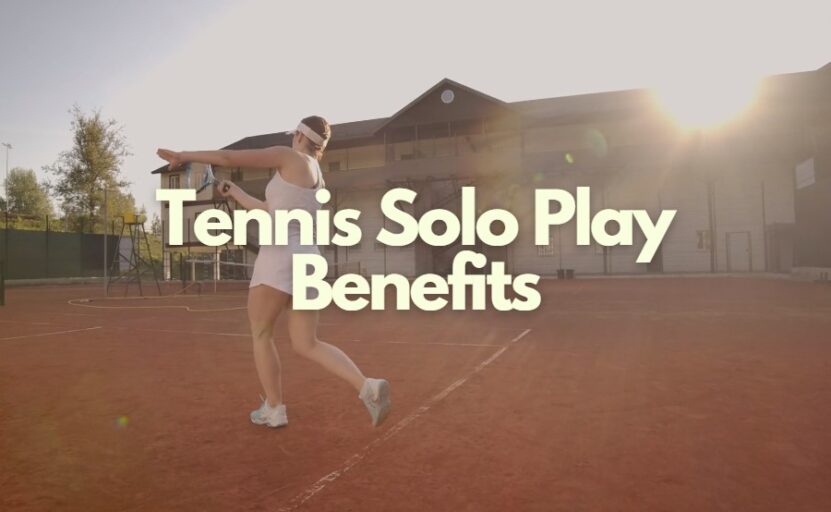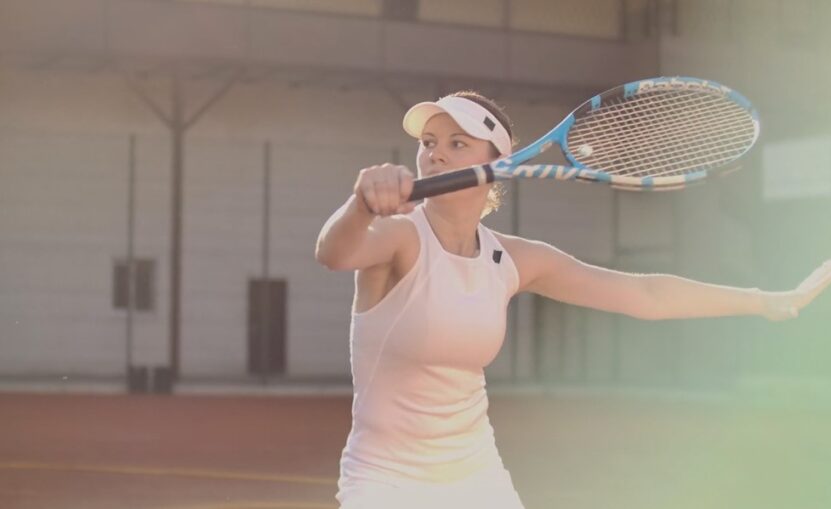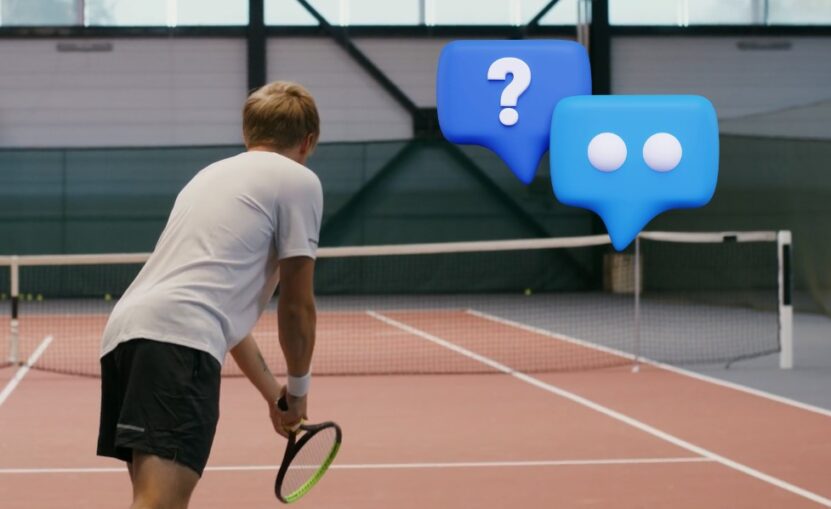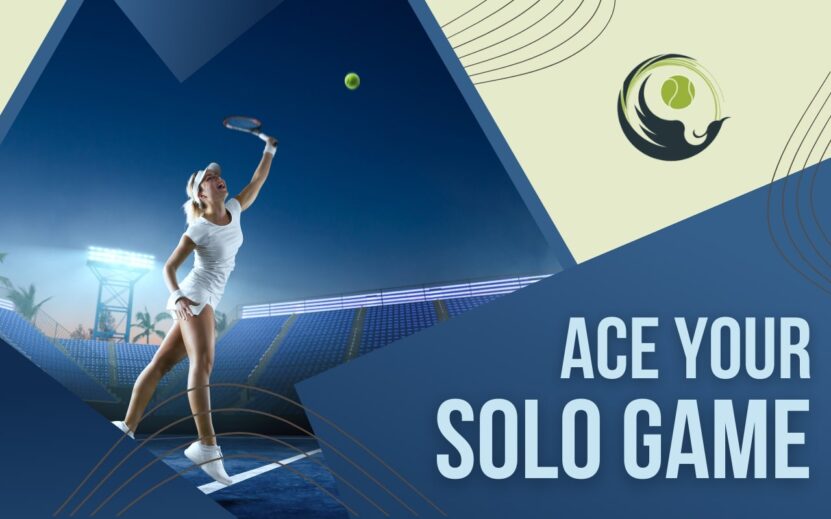Playing tennis alone may not be the same as playing with a partner or a coach, but it is still an effective way to improve your skills, technique, and fitness. Practicing alone can be a great opportunity to work on your weaknesses and develop your strengths. In this blog post, we will discuss some tips and techniques on how to play tennis alone and get the most out of your solo practice sessions.
Tip #1: Find a Wall
One of the best ways to play tennis alone is to find a wall. A wall can be an excellent partner when you don’t have someone to hit with. Look for a flat surface that is not too hard, and make sure there is enough space to hit the ball without damaging anything. The best walls are those that are high and wide enough to provide a decent rebound.
Once you have found a suitable wall, stand about five to six feet away from it, and practice hitting forehands, backhands, volleys, and serves. Start with easy shots, and gradually increase the speed and intensity of your hits. Remember to focus on your technique, footwork, and timing, and try to hit the ball as cleanly and accurately as possible.
Tip #2: Use a Tennis Ball Machine
If you have access to a tennis ball machine, you can use it to play tennis alone. This machine can simulate a real opponent and provide you with a constant stream of shots to practice against. It can also be adjusted to vary the speed, spin, and trajectory of the ball, which can help you develop your skills in different areas.
To use a tennis ball machine, set it up at the other end of the court, and adjust the settings to suit your needs. Start with easy shots, and gradually increase the difficulty level as you improve. Practice hitting different shots, such as forehands, backhands, volleys, and overheads, and try to move around the court as much as possible to simulate a real game.
Tip #3: Practice Footwork and Agility
Playing tennis alone can also be an excellent opportunity to work on your footwork and agility. You can practice drills such as the ladder drill, the cone drill, and the agility ladder to improve your foot speed, coordination, and balance on the court. These drills can help you improve your ability to change direction quickly, move to the ball, and recover to your base position.
The ladder drill involves using a ladder placed on the court to practice a series of footwork drills. The cone drill involves setting up cones on the court and practicing different movements around them, such as forward and backward sprints, side shuffles, and crossover steps. The agility ladder is a series of squares on the court that you can use to practice footwork drills, such as side steps and quick feet.
By practicing footwork and agility drills regularly, you can improve your movement and balance on the court, which can help you become a more effective player.
Tip #4: Visualize Your Opponent
When playing tennis alone, it can be helpful to visualize an opponent on the other side of the net. This can help you practice your shots with more intensity and focus and can also help you develop your tactical skills.
To visualize your opponent, imagine a player with a particular playing style, strengths, and weaknesses. Practice hitting shots that exploit your imaginary opponent’s weaknesses, and work on developing shots that can counter their strengths. This can help you develop your tactical skills and become a more strategic player.
Tip #5: Set Goals and Measure Your Progress
Finally, when playing tennis alone, it is important to set goals and measure your progress. Without a partner or coach to give you feedback, it can be easy to fall into bad habits or repeat the same mistakes over and over again.
To avoid this, set specific goals for each practice session, such as hitting a certain number of forehands or backhands, improving your footwork, or increasing your serve speed. Keep track of your progress over time, and celebrate your successes along the way.
Benefits of Playing Tennis Alone

Playing tennis on your own has several benefits that can help you improve your game and fitness. In this section, we will discuss some of the key benefits of playing tennis alone.
1. Focus on Technique
When you play tennis with a partner or coach, it can be easy to get caught up in the competitive aspect of the game and focus solely on winning. However, when you play tennis alone, you can focus more on your technique and form without worrying about the outcome of the game.
This allows you to take your time and pay more attention to your technique, such as your footwork, grip, and swing. By practicing your technique regularly, you can improve your consistency, accuracy, and power, which can help you become a more effective player.
2. Improve Fitness
Playing tennis alone can also be a great way to improve your fitness. When you practice alone, you have the freedom to choose your own pace and intensity level, which can help you tailor your workout to your specific needs.
For example, you can practice footwork drills to improve your agility or hit the ball against a wall or a tennis ball machine to work on your cardio and endurance. By practicing regularly, you can improve your stamina, speed, and strength, which can help you become a more competitive player.

3. Develop Mental Toughness
Playing tennis alone can also help you develop mental toughness, which is an essential skill for any athlete. When you practice alone, you don’t have anyone else to rely on, which means you have to motivate yourself and stay focused throughout the session.
This can be challenging, but it can also help you build mental resilience and develop a strong work ethic. By practicing regularly and pushing yourself outside of your comfort zone, you can develop the mental toughness needed to succeed in tennis and in life.
4. Work on Specific Skills
When you play tennis alone, you have the opportunity to work on specific skills that you may not be able to practice with a partner or coach. For example, you can practice your serves, returns, and volleys at your own pace without worrying about the speed or direction of the ball.
This can help you identify areas where you need improvement and develop the skills necessary to overcome your weaknesses. By practicing specific skills regularly, you can become a more well-rounded player and improve your overall game.
Frequently Asked Questions

1. Can I really improve my game by playing tennis alone?
Yes! Playing tennis alone can help you improve your technique, fitness, and mental toughness, which are all essential skills for any tennis player. By practicing regularly and focusing on specific areas of your game, you can become a more well-rounded and effective player.
2. What equipment do I need to play tennis alone?
You will need a tennis racket, tennis balls, and either a wall or a tennis ball machine. You may also want to invest in agility cones, an agility ladder, and other equipment to help you practice footwork and agility drills.
3. How do I choose the right wall or tennis ball machine to practice with?
When choosing a wall or tennis ball machine to practice with, consider your skill level, goals, and budget. Walls are great for beginners or players on a budget, while tennis ball machines offer more advanced features and can be programmed to simulate different playing styles.
4. What are some tips for staying motivated when playing tennis alone?
Staying motivated when playing tennis alone can be challenging, but there are several strategies you can use to stay focused and committed. These include setting specific goals, varying your practice routine, practicing with a purpose, and tracking your progress over time.
5. How often should I practice tennis alone?
The frequency of your solo practice sessions will depend on your schedule, goals, and other commitments. However, it is generally recommended to practice at least 2-3 times per week to see noticeable improvements in your game.
6. Can solo tennis practices be boring?
Playing tennis alone can be more repetitive and less social than playing with a partner or coach. However, by varying your practice routine, setting specific goals, and focusing on your technique and form, you can make your solo practice sessions more engaging and enjoyable.
Final Words
Playing tennis alone can be a great way to improve your skills, technique, and fitness. By using a wall or a tennis ball machine, practicing footwork and agility drills, visualizing your opponent, and setting goals for yourself, you can make the most of your solo practice sessions and become a better player.
Remember to stay focused, disciplined, and committed to your goals, and you will see the results in your game. If you want to learn more about tennis net height, check out the article we have recently published, and remember to stay tuned to our website as we update our content on a daily basis.

